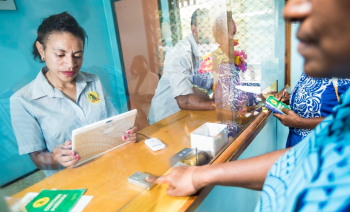Article originally published in the public group on Migration & Asylum
More than 22% of people across Africa are dependent on remittances. These relatively small, person-to-person money transfers sent home regularly by migrants and diaspora, are essential in supporting the livelihoods of friends and families back home. The EU is the largest sending region1, with an estimated EUR 17 billion transferred to Africa in 2018 (World Bank), from which EUR 7.5 billion went to Sub-Saharan Africa.
The COVID-19 pandemic is harming senders and receivers due to loss of employment and income, mobility and travel restrictions, reduced access to money transfer services, and increased health costs. On top of this, intense lockdowns across most of Europe have challenged the African diaspora who want to send money home. The COVID-19 net impact on the remittances market remains unknown. Data is frustratingly weak. Projections initially estimated a steep fall; however, the impact of the pandemic on the remittances market has not been as severe as initially feared. Informal channels of sending money have reduced, while digital transfers have increased. Unfortunately, these solutions are not accessible to all. Families living in rural areas cannot access these services and there are long standing obstacles to make cross-border remittances safe, quick and cheap across the board.
Good practices to support remittances flows
DG INTPA G6. Migration and Forced Displacement Unit is conducting a quick analysis with the support of the Methodological Knowledge Support (MKS) programme, which also includes identifying the following good practices aimed at overcoming remittances markets obstacles and avoiding future crises to the environment as the one caused by COVID:
1. Intra-regional programme for cross-border payments and remittances
COVID-19 has made it necessary to harmonise the legal and regulatory frameworks of the eight sub-regional economic communities existing in Africa2, making intra-regional payments easier, faster and cheaper. The EU can leverage its experience to support beneficial action on intra-regional remittances and to reduce the cost of operating on the continent by:
- Harmonising legislation and regulations for payment service providers and e-money issuers, including remittance service providers (RSPs) at regional level, and opportunities for operating with the same licence within the same region (passporting);
- Integrating mobile money company providers into the national or regional payment systems, hence not limiting it to the banking sector;
- Enabling faster payments for regional transfers.
2. Using remittances for development interventions

A good example in the field of using remittances to develop small businesses in Africa is the WIDU.africa platform. This German online platform3 is targeting those in the diaspora interested in developing Africa's small business sector. The WIDU.africa platform supports several different development agendas, including the promotion of remittances through formal channels for productive purposes, encouraging the diaspora network to invest, and supporting small businesses in Africa. Since the launch, in 2019, there have been over 3,500 registrations, 950 approved projects4, and over EUR 2 million mobilised in investments, suggesting there is an appetite from both sides for use of this kind of platform.
There is potential to involve other EU Member States to extend this platform's model to other African countries. This could reinforce additional funding programmes to support small businesses, in particular those whose activities contribute to overcoming the COVID-19 crisis (e.g. making masks, supporting taxi companies, or delivering food).
While these proposals are not a comprehensive list of all potential action, they do provide insight into promising areas for further consideration. Some are in direct response to the pandemic and others are aligned with existing EU-funded remittances programmes listed below.
|
Existing EU-funded remittances programmes
|
1 In 2018, the continent received EUR 72 billion in remittances (World Bank).
2 More information about the Regional Economic Communities in Africa.
3 WIDU.africa is a flagship project for Germany's Federal Ministry of Economic Cooperation and Development (BMZ) through its development agency, Deutsche Gesellschaft für Internationale Zusammenarbeit (GIZ).
4 Over 80% of the projects are in the informal sector, with 20% in rural area and 5,000 planned jobs – 60% of which are for women.
5 « Programme de contraste à la migration illégale à travers l’appui au Secteur Privé et à la création d’emplois au Sénégal »




Log in with your EU Login account to post or comment on the platform.